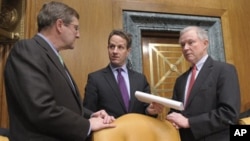While some U.S. legislators seek to slash this year's federal spending amid a $1.6 trillion deficit, a fierce battle over future expenditures has only just begun. That battle has yet to address programs that provide income and health care to retirees - the costs of which will soar in coming decades.
Meanwhile, a new study shows Americans eager to see the nation's finances improve, but resistant to cuts in government services or higher taxes to accomplish that goal.
The budget battle engulfing Washington can be thought of in three parts: current domestic non-security spending, future domestic non-security spending, and so-called entitlements like Social Security and Medicare. Although legislators of both parties and the White House are positioning themselves in all three arenas, it is current spending that is grabbing today’s headlines.
Republicans want to drastically slash what the federal government spends this year. Democrats and the White House do not. With the government’s authorization to spend set to expire in coming days, the very real possibility of a federal shut-down looms unless a deal can be struck.
At the same time, lawmakers are tasked with mapping out next year’s funding. President Barack Obama began the discussion this week by submitting his 2012 budget to Congress that proposes a five-year spending freeze and limiting or ending tax breaks for the wealthy and major corporations.
Republicans, like Utah Senator Orrin Hatch, were not impressed. "Over the last couple of years, the president and Congress have been spending like drunken sailors. Spending as a percentage of our economy is at levels we have not seen since World War II," he said.
Tempers flared when the president’s budget director, Jacob Lew, testified on Capitol Hill this week. Republican Representative Tom Price accused Lew and the administration of avoiding an open and honest discussion about the nation’s fiscal imbalances.
Price: "When does that discussion begin?"
Lew: "Congressman, if you look at what was going on ..."
Price: "Mr. Director, when does that discussion begin?"
Lew: "I am happy to answer that question if you give me a moment."
Price: "You are not answering the question. You haven’t answered ..."
Lew: "The president put down a budget that we think takes the first and very important step of showing how we get to a sustainable deficit by the middle of the decade."
The president’s call for a spending freeze does not go far enough for Republicans, but goes too far for many progressive Democrats. Oregon Congressman Peter Defazio says spending restraint alone will not balance the budget. "You can’t get there simply by cutting. So let’s get real," he said.
Domestic non-security, non-entitlement spending accounts for less than 15 percent of federal expenditures. Members of both parties, as well as the Obama administration, agree that America’s long term fiscal health will continue to be imperiled until revenue shortfalls for programs like Medicare are corrected.
Treasury Secretary Timothy Geithner said, "Over time, you are going to see our commitments on entitlements start to eat away a much more dramatic share of GDP [U.S. gross domestic product] over time, and that is untenable, unsustainable."
But Republicans are slamming the president for failing to include entitlement reform proposals in his budget. Senate Minority Leader Mitch McConnell accused Mr. Obama of ignoring the advice of his own deficit commission, which recommended an overhaul of federal spending commitments to the aged and disadvantaged. "We are still waiting for the president to lead. One thing I can tell you: there will be no entitlement reform without presidential leadership," he said.
Administration officials say entitlement reform proposals will be forthcoming, once revenue shortfalls in other parts of the budget are addressed. Meanwhile, Democrats accuse Republicans of fiscal hypocrisy, noting that America had a budget surplus under a previous Democratic president - Bill Clinton - that was turned into a deficit under his Republican successor, George W. Bush.
U.S. politicians are responding to a mixed and contradictory message from the American people, according to Michael Dimock of the Pew Research Center, which issued a study this week on public attitudes towards government spending and debt.
"Cutting domestic spending gets a lot of support these days in the abstract. But when you get down to the individual line items [in the budget], people recognize the benefits of those programs, and often tend to prefer increased spending in a lot of these areas over decreased spending," he said.
Polling conducted by the Pew Research Center suggests Americans want to see shared sacrifice when it comes to budget cuts, and a mixed approach overall to close the budget gap. "The vast majority of Americans say it is going to take a combination of both tax increases and spending cuts to really address the deficit, and that crossed party lines," he said.
An appetite for a mixed approach would seem to favor President Obama’s budget plan. Yet the American people just elected a Republican-led House of Representatives, and boosted Republican numbers in the Senate. The vast majority of new Republicans made campaign promises to drastically cut federal spending and steadfastly oppose any tax hikes. So far, they are holding firm on those pledges.


















